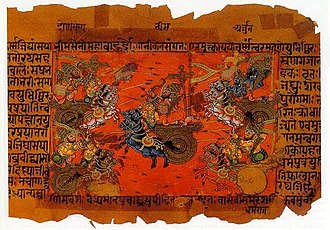Mahabharata

Mahabharata is one of the two major Sanskrit epics of ancient India, the other being the Ramayana. It narrates the struggle between two groups of cousins in the Kurukshetra War and the fates of the Kaurava and the Pandava princes and their successors. It also contains philosophical and devotional material, such as a discussion of the four "goals of life" or purusharthas. Among the principal works and stories that are a part of the Mahabharata are the Bhagavad Gita, the story of Damayanti, an abbreviated version of the Ramayana, and the Rishyasringa, often considered as works in their own right.
Composition and Authorship[edit]
Traditionally attributed to the sage Vyasa, the Mahabharata is said to have been written in the form of a poem containing nearly 100,000 shlokas or couplets. It is the longest epic poem known and has been described as "the longest poem ever written". Its longest version consists of over 100,000 shloka or over 200,000 individual verse lines (each shloka is a couplet), and long prose passages. At about 1.8 million words in total, the Mahabharata is roughly ten times the length of the Iliad and the Odyssey combined, or about four times the length of the Ramayana.
Structure[edit]
The Mahabharata is structured around the central story of the dynastic struggle but includes much philosophical and devotional material. The narrative is divided into 18 books called Parvas, with the Harivamsha considered as an appendix. This structure allows for a vast and complex array of sub-stories to be included, making the Mahabharata not just a story of a war, but a vast epic of morals, lessons, and philosophical thoughts.
Key Characters[edit]
The key characters of the Mahabharata include Krishna, who is a key strategist for the Pandavas and also a deity in his own right; the Pandava brothers, namely Yudhishthira, Bhima, Arjuna, Nakula, and Sahadeva; and their rivals, the Kauravas, especially Duryodhana and Karna. Other important characters include Draupadi, the wife of the Pandavas; Bhishma, the grand uncle of both the Pandavas and the Kauravas; and Drona, the military guru of both the Pandavas and the Kauravas.
Themes and Philosophy[edit]
The Mahabharata explores themes such as duty, righteousness, and the moral dilemmas of warfare. The Bhagavad Gita, which is a part of the Mahabharata, is a key philosophical text that discusses the concept of dharma (duty/righteousness) and the path to spiritual realization. The epic also explores the idea of karma, the cycle of rebirth, and the importance of doing one's duty in life.
Cultural Impact[edit]
The Mahabharata has had a profound impact on the culture and literature of the Indian subcontinent and the Hindu religion. It has been adapted into numerous plays, films, and television series. The stories and characters of the Mahabharata are deeply embedded in the cultural consciousness of India, influencing its art, religion, and philosophy.
This article is a literature-related stub. You can help WikiMD by expanding it!
Ad. Transform your life with W8MD's Budget GLP-1 injections from $75


W8MD offers a medical weight loss program to lose weight in Philadelphia. Our physician-supervised medical weight loss provides:
- Weight loss injections in NYC (generic and brand names):
- Zepbound / Mounjaro, Wegovy / Ozempic, Saxenda
- Most insurances accepted or discounted self-pay rates. We will obtain insurance prior authorizations if needed.
- Generic GLP1 weight loss injections from $75 for the starting dose.
- Also offer prescription weight loss medications including Phentermine, Qsymia, Diethylpropion, Contrave etc.
NYC weight loss doctor appointmentsNYC weight loss doctor appointments
Start your NYC weight loss journey today at our NYC medical weight loss and Philadelphia medical weight loss clinics.
- Call 718-946-5500 to lose weight in NYC or for medical weight loss in Philadelphia 215-676-2334.
- Tags:NYC medical weight loss, Philadelphia lose weight Zepbound NYC, Budget GLP1 weight loss injections, Wegovy Philadelphia, Wegovy NYC, Philadelphia medical weight loss, Brookly weight loss and Wegovy NYC
|
WikiMD's Wellness Encyclopedia |
| Let Food Be Thy Medicine Medicine Thy Food - Hippocrates |
Medical Disclaimer: WikiMD is not a substitute for professional medical advice. The information on WikiMD is provided as an information resource only, may be incorrect, outdated or misleading, and is not to be used or relied on for any diagnostic or treatment purposes. Please consult your health care provider before making any healthcare decisions or for guidance about a specific medical condition. WikiMD expressly disclaims responsibility, and shall have no liability, for any damages, loss, injury, or liability whatsoever suffered as a result of your reliance on the information contained in this site. By visiting this site you agree to the foregoing terms and conditions, which may from time to time be changed or supplemented by WikiMD. If you do not agree to the foregoing terms and conditions, you should not enter or use this site. See full disclaimer.
Credits:Most images are courtesy of Wikimedia commons, and templates, categories Wikipedia, licensed under CC BY SA or similar.
Translate this page: - East Asian
中文,
日本,
한국어,
South Asian
हिन्दी,
தமிழ்,
తెలుగు,
Urdu,
ಕನ್ನಡ,
Southeast Asian
Indonesian,
Vietnamese,
Thai,
မြန်မာဘာသာ,
বাংলা
European
español,
Deutsch,
français,
Greek,
português do Brasil,
polski,
română,
русский,
Nederlands,
norsk,
svenska,
suomi,
Italian
Middle Eastern & African
عربى,
Turkish,
Persian,
Hebrew,
Afrikaans,
isiZulu,
Kiswahili,
Other
Bulgarian,
Hungarian,
Czech,
Swedish,
മലയാളം,
मराठी,
ਪੰਜਾਬੀ,
ગુજરાતી,
Portuguese,
Ukrainian